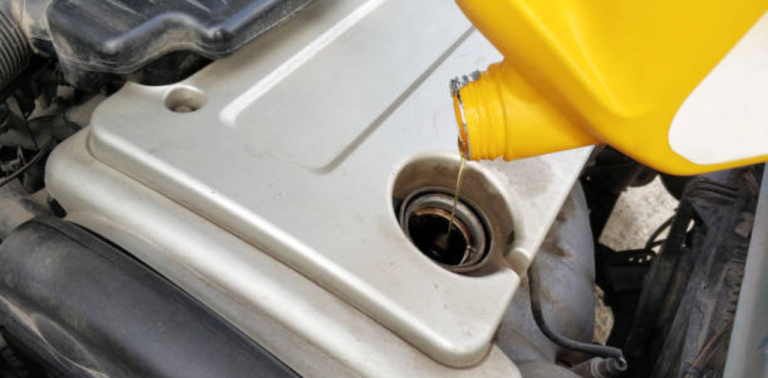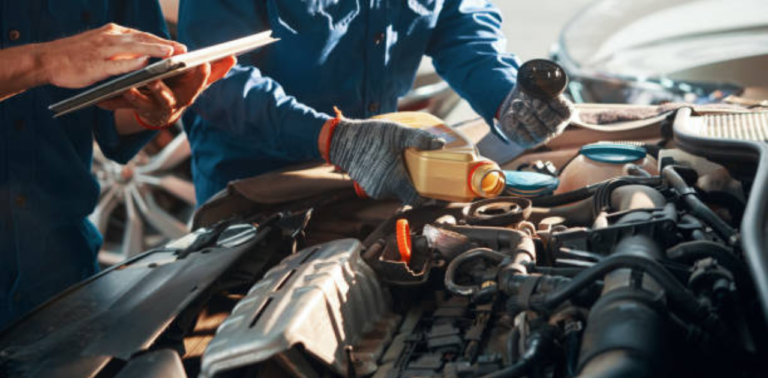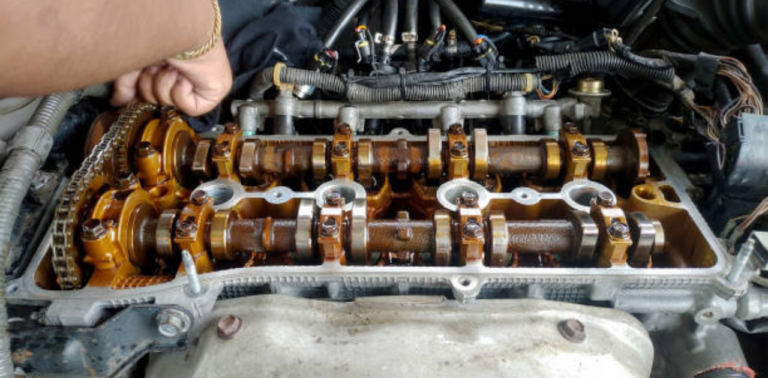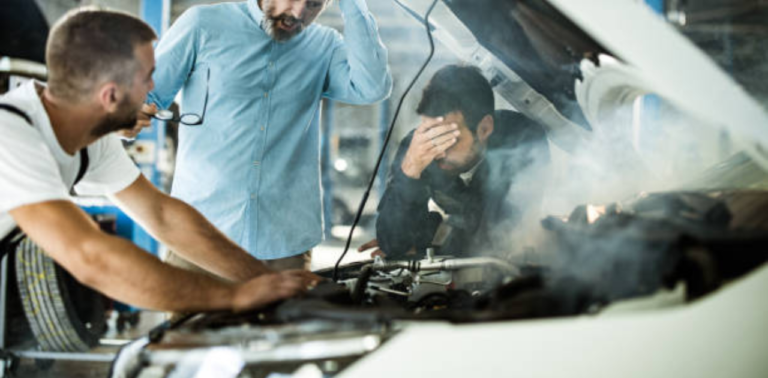What are the 10 Causes of Oil Leakage on Exhaust Manifold?
An oil leak can be a concerning issue in any vehicle, and when it originates from the exhaust manifold, it demands immediate attention. The exhaust manifold plays a crucial role in properly functioning a vehicle’s engine, and an oil leak can lead to various problems. In this article, we will explore 10 common reasons for what Causes of Oil Leakage on Exhaust Manifold.
1. Worn Gaskets or Seals
Gaskets and seals are used to create a tight seal between different components in the engine. Over time, these gaskets and seals can wear out due to heat and pressure, leading to oil leaks. If the gasket or seal between the exhaust manifold and the engine block is worn, it can cause oil to leak into the exhaust manifold.
2. Cracked Exhaust Manifold
The exhaust manifold is subjected to high temperatures, and over time, this can cause it to crack. A cracked exhaust manifold can create an opening for oil to leak onto its surface. Regular maintenance and timely repairs can prevent this issue from occurring.
3. Improperly Torqued Bolts
During repairs or maintenance, if the bolts that secure the exhaust manifold are not properly torqued, it can result in a loose connection. This looseness can cause oil to seep out and come into contact with the exhaust manifold, leading to visible leaks.
4. Excessive Oil Pressure
High oil pressure within the engine can overwhelm the gaskets and seals, causing them to fail and resulting in oil leaks. It’s important to monitor and maintain proper oil pressure to prevent this issue.

5. Engine Overfilling
If the engine oil is overfilled, it can create excess pressure within the engine. This excess pressure can force oil to escape from the engine and leak onto the exhaust manifold, manifesting as an oil leak.
6. Clogged PCV Valve
The Positive Crankcase Ventilation (PCV) valve regulates the flow of gases between the crankcase and the intake. If the PCV valve is clogged or malfunctioning, it can lead to increased pressure in the crankcase, causing oil to leak onto the exhaust manifold.
7. Damaged Piston Rings
Piston rings help in sealing the combustion chamber and preventing oil from entering. If these rings are damaged or worn, they may allow oil to escape into the combustion chamber and subsequently leak onto the exhaust manifold.
8. Excessive Blow-by
Blow-by occurs when combustion gases leak past the piston rings and into the crankcase. Excessive blow-by can lead to increased crankcase pressure, forcing oil out through any available openings, including onto the exhaust manifold.
9. Old or Degraded Oil
Using old or degraded engine oil can lead to a breakdown of its properties, including its ability to seal components effectively. This can result in oil leaks, especially around the exhaust manifold where the heat can exacerbate the issue.
10. Incorrect Oil Grade
Using the wrong grade of engine oil for your vehicle can cause lubrication issues and potentially lead to leaks. Always ensure that you’re using the recommended oil grade for your specific engine to maintain proper functioning and prevent leaks.
How To Fix an Exhaust Manifold Oil Leak?
An exhaust manifold oil leak can be a problem that needs attention to prevent further damage to your vehicle and maintain optimal engine performance. Here’s a step-by-step guide to help you fix an exhaust manifold oil leak:

1. Diagnose the Leak:
Identify the source and location of the leak. Ensure the leak comes from the exhaust manifold and not from a different part of the engine.
2. Safety Precautions:
Ensure the vehicle is on a level surface, the engine is cool, and the parking brake is engaged. Wear appropriate safety gear, including gloves and safety glasses.
3. Inspect the Exhaust Manifold:
Check for cracks, holes, or other damage in the exhaust manifold. Clean the area around the manifold to get a clear view of the damage.
4. Remove the Exhaust Manifold:
Depending on your vehicle, this may involve removing other components like heat shields, oxygen sensors, or other parts that obstruct access to the exhaust manifold. Follow your vehicle’s repair manual for specific instructions.
5. Replace Gaskets and Seals:
Remove the old exhaust manifold gasket(s) and replace them with new ones. Inspect and replace any other seals or gaskets that may be damaged.
6. Check Bolts and Studs:
Inspect the bolts and studs that secure the exhaust manifold to the engine block. Replace any damaged or worn-out bolts or studs.
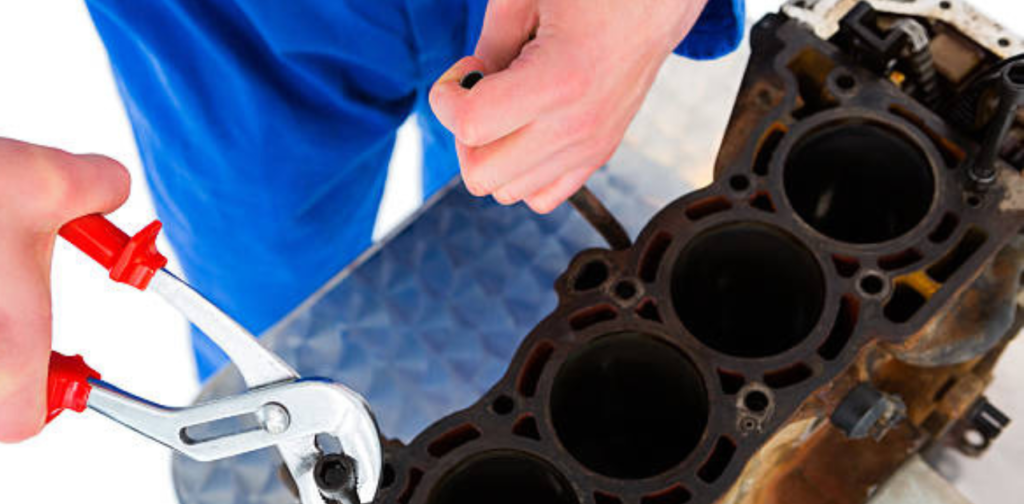
7. Clean and Prepare Surfaces:
Clean the mounting surfaces on both the exhaust manifold and the engine block thoroughly. Remove any residue or old gasket material using a gasket scraper or a suitable tool.
8. Install the Exhaust Manifold:
Carefully position the exhaust manifold back in place, ensuring that it aligns with the mounting holes on the engine block. Tighten the bolts or studs according to the manufacturer’s torque specifications.
9. Reconnect Components:
Reattach any components removed during the removal process, such as heat shields, oxygen sensors, etc.
10. Check for Leaks:
Start the engine and carefully inspect the exhaust manifold for any signs of leaks. Listen for unusual sounds or hissing, and check for visible oil leaks.
11. Test Drive:
Take a short test drive to ensure that the repair was successful and that there are no further leaks or issues.
12. Monitor for Leaks:
Keep an eye on the exhaust manifold and surrounding areas for a few days to ensure the leak has been effectively fixed.
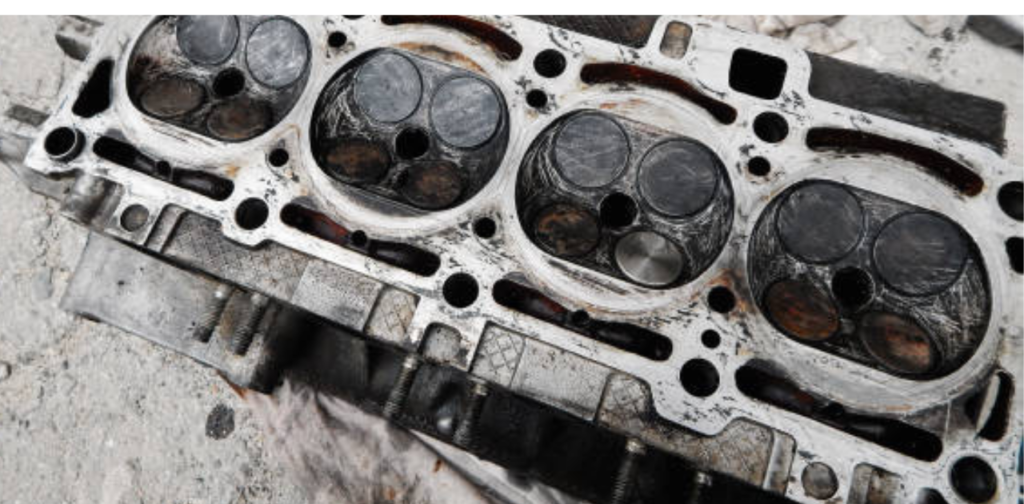
How To Avoid Exhaust Manifold Oil Leaks?
Exhaust manifold oil leaks may occur for a variety of reasons, and it is important to fix them immediately to avoid damage to your vehicle and ensure optimal performance. Below are some tips for avoiding oil leaks in the exhaust manifold:
Regular maintenance:
Perform regular maintenance work on your vehicle, including oil changes and inspections, to identify potential problems early on.
Check oil level:
Make sure your engine oil is in the correct state. Low oil levels can lead to increased heat and pressure, which can lead to leaks.
Use high-quality oil and filter:
Choose high-quality engine oil and filters that meet or exceed the manufacturer’s specifications. This can help prevent premature wear and tear of engine components.
Inspect seals and closures:
Check the gaskets of the exhaust manifold periodically for signs of wear, damage, or wear. Replace them if necessary.
Tighten the screws properly:
Ensure that the screws securing the exhaust manifold are tightened according to the manufacturer’s specifications. Loose screws can lead to leaks.
Fix engine misfires:
Faulty ignition of the engine can lead to higher exhaust temperatures, which in turn can cause the seals to fail. Fix misfires immediately by identifying and fixing the underlying issues.
Avoid overheating:
Overheating can accelerate the wear and tear of seals. Make sure your cooling system is in good condition and resolve any overheating problems immediately.
Check for cracks or damage:
Inspect the exhaust manifold periodically for cracks or other damage. If you notice any problems, replace the bend if necessary.
Proper installation:
If you are replacing seals or the exhaust manifold, make sure they are installed properly. Follow the manufacturer’s guidelines and torque specifications.
Monitor the state of the turbocharger:
If your vehicle is equipped with a turbocharger, you should monitor its condition and resolve any problems immediately. Problems with the turbocharger can lead to increased exhaust pressure and possible leaks.
Avoid overloading the engine:
Avoid excessive loading of your engine, as this can lead to increased heat and pressure, which can in turn cause leaks.
Professional inspection:
If you suspect an oil leak in the exhaust manifold or detect symptoms such as the smell of burning oil, unusual noises, or reduced performance, you should have your vehicle checked by a professional mechanic.

Conclusion:
Oil leaking onto the exhaust manifold can stem from various underlying issues, ranging from worn gaskets to improper oil grades. Regular maintenance, timely repairs, and using the correct engine oil can go a long way in preventing oil leaks and ensuring the longevity of your vehicle’s exhaust manifold and engine.
Frequently Asked Questions
What causes oil to come out of the exhaust manifold?
Oil can come out of the exhaust manifold due to worn gaskets or seals, a cracked manifold, or excessive oil pressure.
What 3 things can cause an oil leak?
Three common causes of an oil leak are worn gaskets or seals, cracked components like the exhaust manifold, and excessive oil pressure.
How do I stop my exhaust manifold from leaking oil?
To stop an exhaust manifold from leaking oil, you should replace worn gaskets or seals, repair any cracks in the manifold, and ensure proper oil pressure and levels.
What happens if oil leaks into the exhaust manifold?
If oil leaks into the exhaust manifold, it can burn and produce smoke, foul the engine, affect performance, and potentially cause damage to the exhaust system. Immediate attention and repair are essential.

